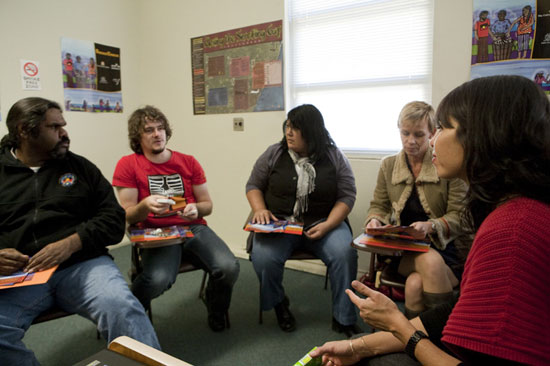Smokecheck program helps Australian aborigines quit smoking
The training program, initiated at the University of Sydney, Australia, aims to reduce the smoking rate among Aboriginal communities, and has trained 1,000 native health workers.

The program, also known as SmokeCheck , was launched in 2007 and received joint funding from the NSW Department of Health and NSW Cancer Institute. The program has trained 1,000 medical staff and aboriginal health professionals throughout New South Wales, Australia.
'SmokeCheck's goal is to train a wide range of health workers and other health professionals who are Aboriginal people in New South Wales, Australia, who will take care of the aboriginals. Other, and encourage their customers to smokers quit, 'said Luciana Massi, senior lecturer at SmokeCheck Program.
" SmokeCheck program is really interesting to reach such a milestone. Smoking habits are contributing to high mortality rates of indigenous peoples and significantly increase serious illnesses such as cardiovascular disease. , cancer and diabetes, 'Massi said.
Sandra Wallace, is one of 1,000 trained health workers, and a native health educator in Sydney. Currently Sandra is majoring in promoting health care for indigenous people at the University of Sydney, Australia.
Smoking rates in the Australian Aboriginal community are almost twice as high as those of non-Aboriginal people, although efforts have been made to reduce smoking rates among Aboriginal people over the past decade.
The Health Report for the period (2006-2009) is for adult aboriginals, indicating that up to 33.9% of adult aboriginals are smokers today, compared with 17.2% of the population. in general. This suggests that from a significant reduction in the findings of the 2002-2005 report, which indicates more than four out of every 10 (43.2 percent) indigenous people are smokers.
SmokeCheck program, seen as a leading evidence based on the smoking cessation program, which was specially designed for Aboriginal people, continues to hold a unique position, continuing to contribute to reducing the rate. Smoking in Aboriginal community in New South Wales, Australia.
Ms Massi explained: ' Every time a customer comes to the medical service they may not have thought about giving up, but thanks to the intervention of the SmokeCheck program's medical staff, encourage them to think. about why they smoke. '
' Health workers can use their insights into specific cultures to support their clients in giving up smoking and maintain this at subsequent visits in the future. , 'according to Massi.
Reducing high smoking rates among Aboriginal communities will help narrow the gap of 17 years of life between Aboriginal and modern Australians.
- 3 reasons why you can't quit smoking
- New medicine helps quit smoking
- Quick walking helps quit smoking
- Quit smoking without gaining weight
- Why is it so hard to quit smoking?
- Is there going to be a smoking cessation vaccine?
- Women who quit smoking before age 40 will live up to 9 years
- Cigarettes are harder to quit than drugs
- Smoking will permanently damage the coffee
- Good news for people who want to quit smoking
- Nutrition for people who want to quit smoking
- Australia is the first explorer country in the world
 Green tea cleans teeth better than mouthwash?
Green tea cleans teeth better than mouthwash? Death kiss: This is why you should not let anyone kiss your baby's lips
Death kiss: This is why you should not let anyone kiss your baby's lips What is salmonellosis?
What is salmonellosis? Caution should be exercised when using aloe vera through eating and drinking
Caution should be exercised when using aloe vera through eating and drinking